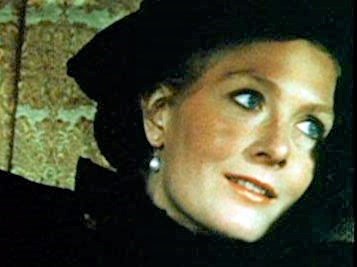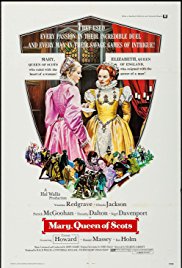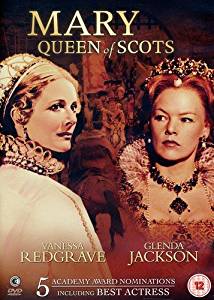Mary, Queen of Scots ** (1971, Vanessa Redgrave, Glenda Jackson, Patrick McGoohan, Trevor Howard, Nigel Davenport, Daniel Massey, Ian Holm, Timothy Dalton) – Classic Movie Review 7901

Director Charles Jarrott’s 1971 Mary, Queen of Scots is worth a look for the heavyweight actresses Vanessa Redgrave and Glenda Jackson in their prime, if not quite at their peak, and for the various star characters actors of the day. It is also worth a look for the handsome production. But, otherwise, producer Hal B Wallis’s old-fashioned, historically inaccurate saga is a disappointment. It was nominated for five Oscars, including Best Actress (Redgrave) and five Golden Globes. Jackson won the Evening Standard British Film Award as Best Actress.
Jackson reprises her role from the Emmy-award winning BBC serial Elizabeth R, which gave her a much better opportunity, while Redgrave plays Mary as a heroine rather than the naive and foolish person she was in real life.

The film takes the idea that it is only a movie and that it is OK to play fast and loose with history. John Hale’s original screenplay embellishes history with a confrontation between the two queens (though they never met in real life). On a smaller point, when Mary returned to Scotland from France, she is shown landing on a beach, whereas she is known to have landed at the port of Leith. It is a smaller point, yes, but belief is all in the detail. However, this being unhistorical is not the film’s main problem. It is the dull, worthy, reverential treatment of the fascinating story that counts most against it.
Timothy Dalton makes a strong impression in a showy, Bafta-nominated performance as Henry, Lord Darnley.
Also in the cast are Trevor Howard as William Cecil, Patrick McGoohan as James Stuart, Nigel Davenport as Lord Bothwell, Daniel Massey as Robert Dudley Earl of Leicester, Ian Holm as David Riccio, Andrew Keir, Tom Fleming, Beth Harris, Frances White, Vernon Dobtcheff, Richard Warner, Jeremy Bulloch, Richard Denning, Robert James, Maria Aitken, Richard Warner, Ral de la Terre, Brian Coburn, Bruce Purchase and Katherine Kath.
Mary, Queen of Scots is directed by Charles Jarrott, runs 128 minutes, is made by Universal Pictures and Hal Wallis Productions, is released by Universal, is written by John Hale, is shot in Technicolor by Christopher Challis, is produced by Hal B Wallis, is scored by John Barry, and is designed by Terence Marsh.
Many of these virtues and failings reappear in Mary Queen of Scots (2018). John Ford and Katharine Hepburn got in there earlier with Mary of Scotland.
Geneviève Bujold turned down the role of Mary, refusing to be typecast after appearing in Anne of the Thousand Days, leading to a falling-out with producer Wallis.
© Derek Winnert 2018 Classic Movie Review 7901
Check out more reviews on http://derekwinnert.com


